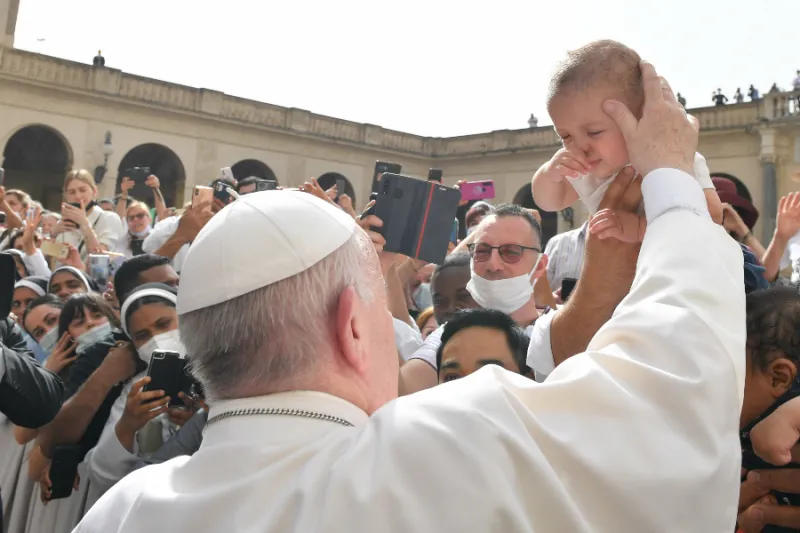
Vatican City, Jun 23, 2021 / 06:35 am (CNA).
At his general audience on Wednesday, Pope Francis warned against preachers who sow division and mistrust online.
“There is no shortage of preachers who, especially through the new means of communication, can disturb communities. They present themselves not primarily to announce the Gospel of God who loves man in Jesus, Crucified and Risen, but to insist, as true ‘keepers of the truth,’ … what is the best way to be Christians,” the pope said June 23.
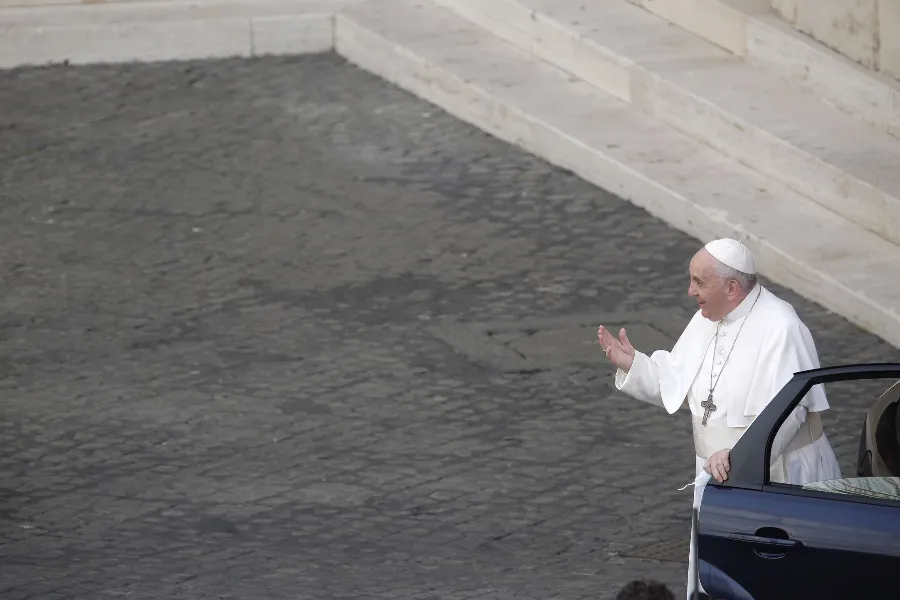
“And they strongly affirm that the true Christianity is the one they adhere to, often identified with certain forms of the past, and that the solution to the crises of today is to go back so as not to lose the genuineness of the faith. Today too, as then, there is a temptation to close oneself up in some of the certainties acquired in past traditions.”
Pope Francis said that these “new preachers” can be recognized by their “rigidity,” which contrasts with “preaching the Gospel that makes us free, makes us joyful.”
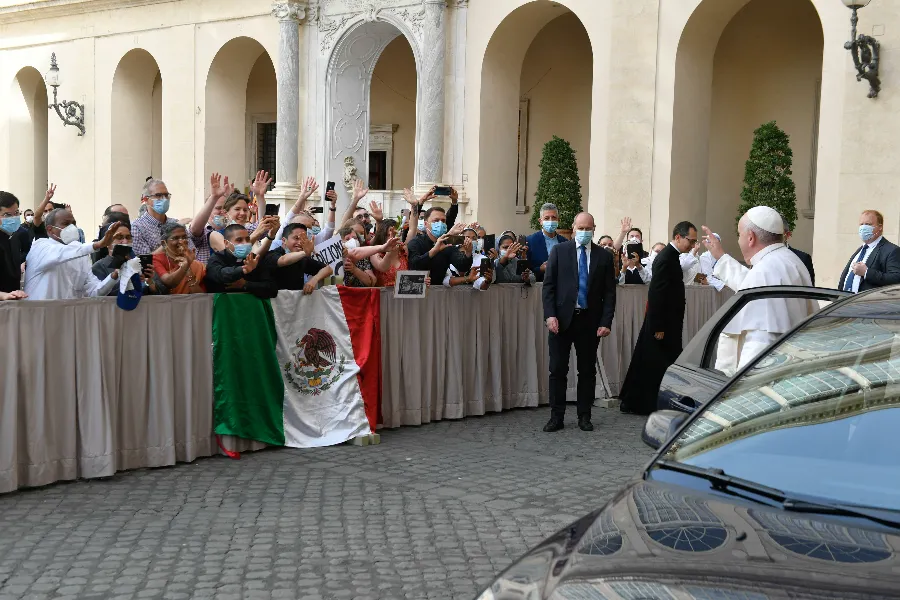
“The new preachers know neither meekness nor obedience,” he said.
The pope began a new cycle of catechesis this week on St. Paul’s Letter to the Galatians, which, he suggested, “seems written for our times.”
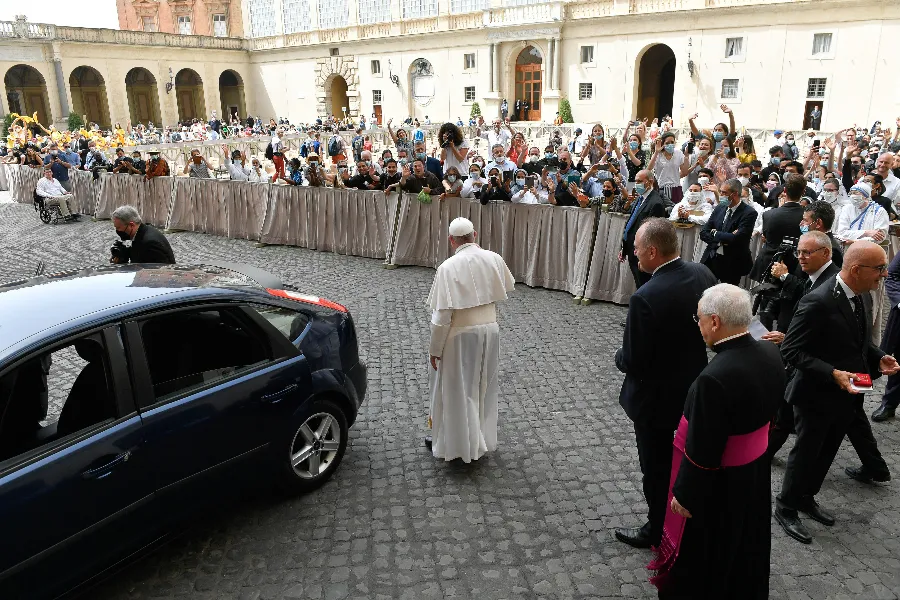
“It is a very important letter, I would say decisive, not only to get to know the Apostle better, but above all to consider some topics that he deals with in depth, showing the beauty of the Gospel,” the pope said.
Paul “addresses some very important themes for the faith, such as those of freedom, grace, and the Christian way of life, which are extremely current because they touch many aspects of the life of the Church of our day. This is a very current letter,” he added.
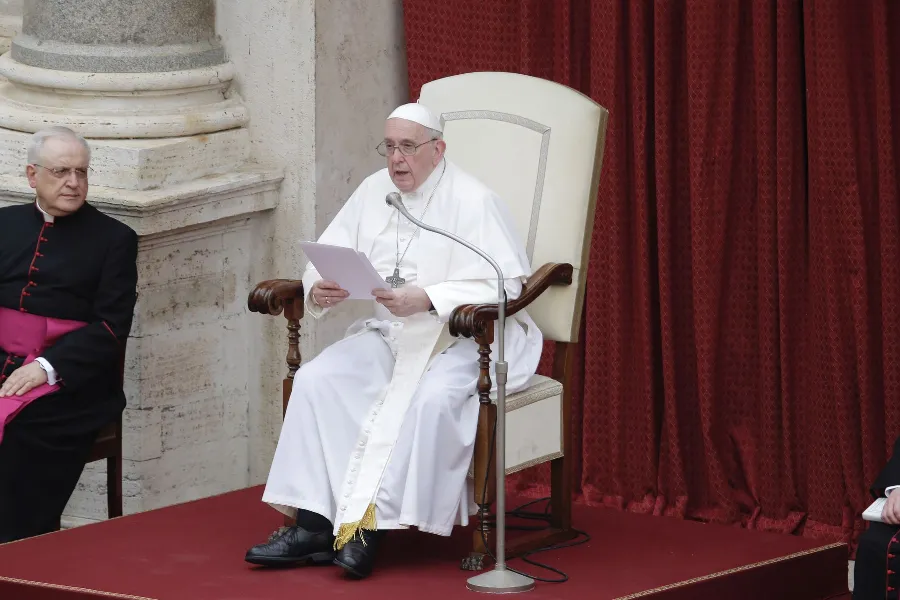
In particular, the pope highlighted how St. Paul responds to a pastoral concern in his Letter to the Galatians: Opponents of Paul had argued that he was not a true Apostle and therefore had no authority to preach the Gospel.
“Indeed, some Christians who had come from Judaism had infiltrated these churches, and began to sow theories contrary to the Apostle’s teaching, even going so far as to denigrate him. They began with doctrine — ‘No to this, yes to that,’ and then they denigrated the Apostle,” he said.
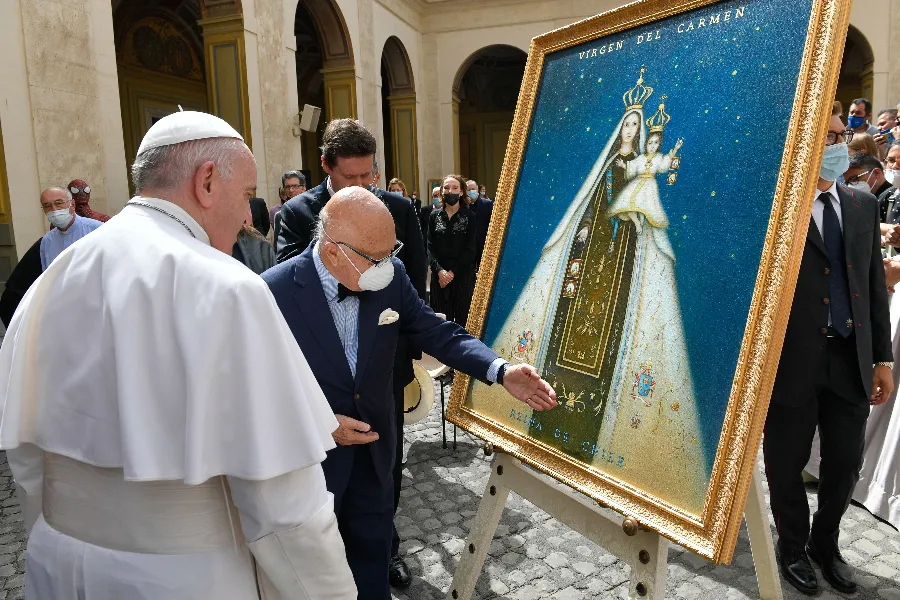
“It is the usual method: undermining the authority of the Apostle. As we can see, it is an ancient practice to present oneself at times as the sole possessor of the truth, the pure, and to aim at belittling the work of others, even with slander.”
Pope Francis said that this is exactly the way that “the evil one” seeks to divide Christian communities today.
“Let us think about how some Christian communities or dioceses first begin with stories, and then they end by discrediting the priest or the bishop. It is precisely the way of the evil one, of these people who divide, who do not know how to build. And in this Letter to the Galatians, we see this process,” he said.
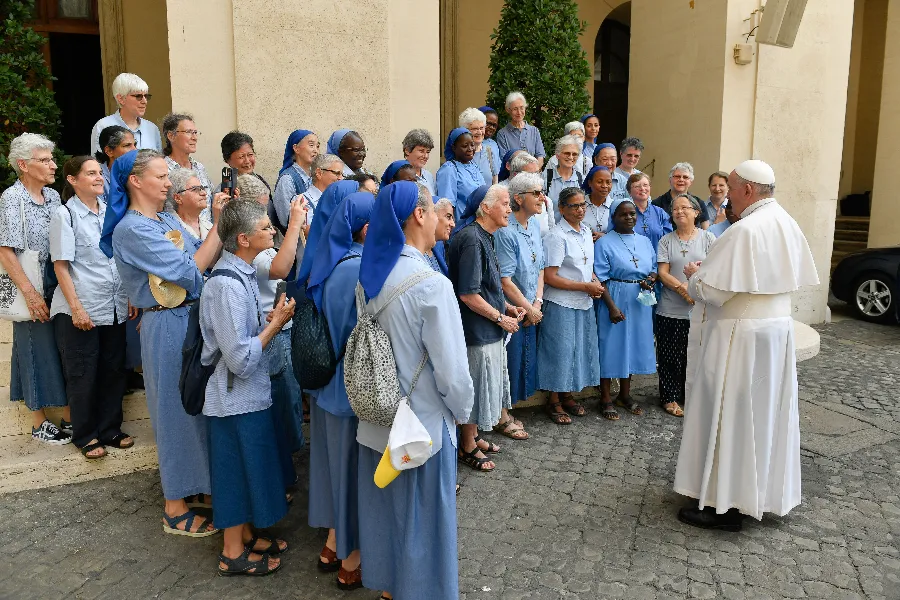
Paul’s Letter to the Galatians also provides a model of missionary evangelization, the pope said.
“In his indefatigable work of evangelization, the Apostle succeeded in founding several small communities scattered throughout the region of Galatia. Paul, when he arrived in a city, in a region, did not construct a great cathedral immediately, no. He created small communities that are the leaven of our Christian culture today,” he said.
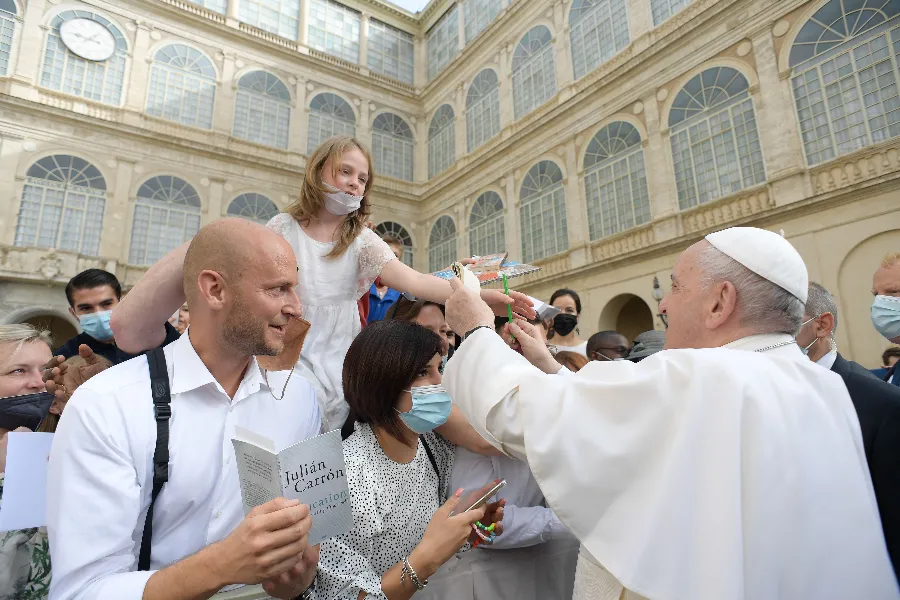
Pope Francis added: “Today, too, this pastoral method is used in every missionary region. I received a letter last week, from a missionary in Papua New Guinea, telling me that he is preaching the Gospel in the forest, to people who do not even know who Jesus Christ was. It is beautiful! One begins by forming small communities.”
At the beginning of the general audience in San Damaso Courtyard, the pope spent nearly 40 minutes greeting pilgrims. He gave blessings, signed prayer cards, greeted infants, and playfully switched his white zucchetto with a young man who held one up from the crowd.
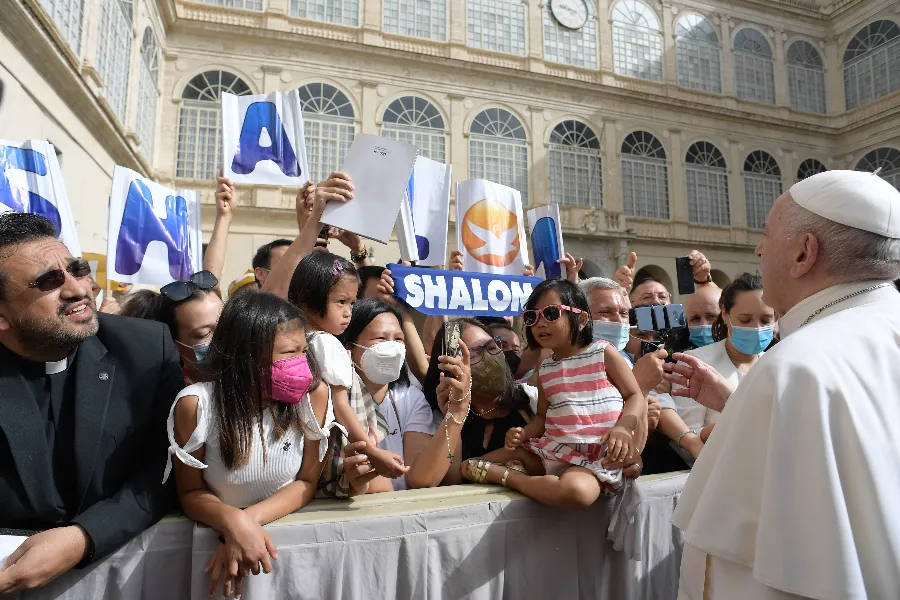
Among the pilgrims gathered in the San Damaso Courtyard, was a friendly neighborhood Spider-Man.
Mattia Villardita volunteers in his free time by dressing up as Spider-Man to visit sick children in hospitals. After meeting the pope in full costume, he told CNA that Pope Francis told him to “take a lot of selfies with the kids in the square.”
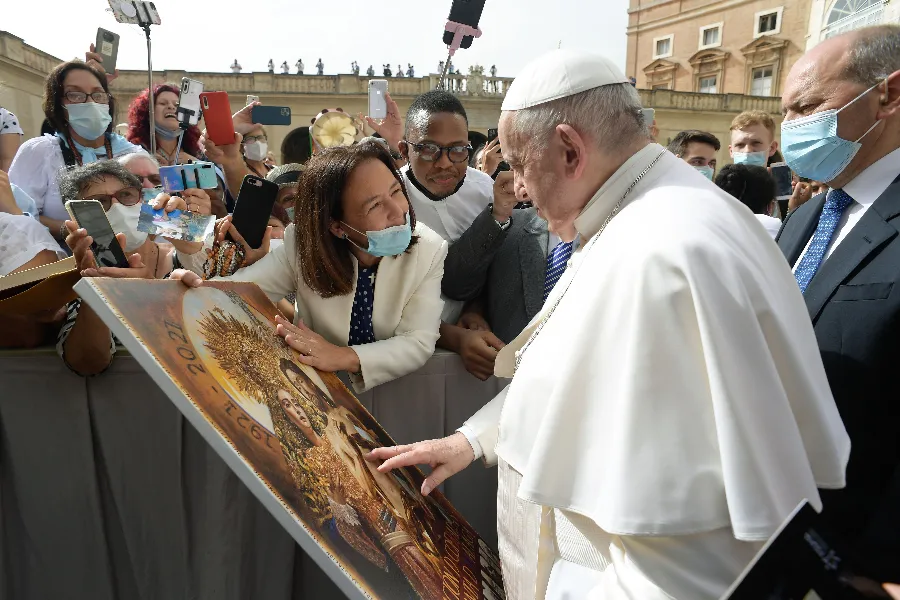
“The path indicated by the Apostle is the liberating and ever-new path of Jesus, Crucified and Risen; it is the path of proclamation, which is achieved through humility and fraternity,” the pope said.
“It is the path of meek and obedient trust … And this meek and obedient way leads forward in the certainty that the Holy Spirit works in the Church in every age. Ultimately, faith in the Holy Spirit present in the Church carries us forward and will save us,” he said.
If you value the news and views Catholic World Report provides, please consider donating to support our efforts. Your contribution will help us continue to make CWR available to all readers worldwide for free, without a subscription. Thank you for your generosity!
Click here for more information on donating to CWR. Click here to sign up for our newsletter.





Rigidity v freedom and joy. “A temptation to close oneself up in some of the certainties acquired in past traditions.” A pontifical doctrine of mercy and love paradigmatic for a new epoch. Certainly, mercy and love are premium dimensions of Christ’s revelation. Traditionalists have difficulty in accommodating what at least appears to be forgetfulness of repentance and conformity to what is now conceived as, “certainties acquired in past traditions”. Now deemed desultory to faith in Christ. For 2000 years? Pope Francis appeals to the Apostle in Galatians the law v faith in Christ. Apparently, Francis perceives a wrongful rigidity in emphasis on the law, rather than the liberating experience of faith in Christ, and effusive merciful love. Although, what Paul teaches in Galatians and Romans specifies is a wrongful, external adherence to Law, rather than faith in Christ that serves God spiritually rather than externally, in spirit and in truth. Law he holds is not abandoned but correctly observed. The Pontiff’s argument is made in Amoris Laetitia, explication of a law of soteriological love as taught by Joseph Fuchs SJ that surpasses natural law, and the rigidity of rules. Isn’t this the crisis disrupting practice of the faith, confusion because what was taught as revealed by Christ for two milleniums as true and permanent has become dubious and at times contradictory during this pontificate? More intelligent, comprehensive analyses of Amoris Laetitia question the validity of a doctrine that by all reasoned estimation omits the need for repentance and conversion of life. Amoris Ch 8 unexplainably omits the work of grace during spiritual hardship. What’s of concern is accommodation, rather than the Way, a way that includes the Cross of self denial in a life of transforming grace. Effects of Francis’ message are what the distressed perceive in the growing accommodation of homosexuality within the Church, gay banners flowing from Church buildings coloring altars promoted by pastors. Entirely open access to the Holy Eucharist Malta, Sicily, Germany, Philippines without the slightest appeal to confession of sins, rectification of irregular lifestyle. Reluctance, even deterrence unleashed on bishops’ collegial efforts to embrace and observe the practice of Eucharist coherence. What then does Pope Francis expect faithfully practicing Catholics to think, or to do? Deny Christ’s Gospels? Jettison 2000 years of Apostolic tradition? Mercy without need to repent may seem joyously liberating. Then, we must ask where is the scriptural evidence, and is this what Christ expects of us?
As usual, shelves of books are not as incisive as one of your paragraphs Father. Tragically, we have a Pope immersed in neophilia, whose style suggests narcissism, as it demonstrates little respect for truths that never change, truths that would be a rebuke to the conceits of a modernity that he never clearly identifies as an evil. His identifications of vanity have been exclusive to tradition and never with those who propose giant schemes that would supercede the power of God acting through every unique individual, even individuals revering received wisdom.
“…these “new preachers” can be recognized by their “rigidity,” which contrasts with
The Pontiff is himself the new preacher, who preaches mercy without repentance.
The Pontiff is himself rigid with those whom he perceives are not buying into his mercy without justice spiel.
Further he states: “preaching the Gospel that makes us free, makes us joyful.” It is living the gospel message in good times and in bad that reaps joy and freedom .
I often think that he might have created a Jeffersonian version of the Gospel, where Jefferson, a self-worshiping man of the “Enlightenment” edited out all the parts he didn’t like. I wonder if Francis edited out Our Lord’s references to The Word as immutable truth and the inevitable suffering of being His disciples.
Jefferson intended his “Virginia Statute of Religious Freedom” (1786) to protect “the Jew and the Gentile, the Christian and Mahometan, the Hindoo, and infidel of every denomination.” So, why not settle for the Enlightenment’s lowest common denominator, which is Deism and “nature and nature’s God” (Declaration of Independence, 1776)?
…Jefferson’s sanitized rendition of the bible (1820) cancels anything distinctive about the incarnate Christ (as does Islam). And, today, of course, this mentality now is indifferently multicultural and therefore anti-Christian—and even exhibits its theological nakedness in the anti-natural rainbow banner. Meanwhile, Jefferson’s motivation was to at least understand better the natural law (as partly distinct from Christian revelation).
So, where does big-tent Catholicism fit in this picture?
I only take notice of Priests online who I feel are the true disciples. Bishop Strickland, Fr. Altman and Vigano the Great. And many other brave soldiers of Christ.
Rather alarming moves afoot in the UN and the EU.
And Pope Francis is worried about “rigid” preachers?
This latest papal catechesis brings to mind his saying Easter Mass at St. Peters Basilica in 2020. The Basilica was empty. He continued, speaking to the crowd of no one present in mind, or body or spirit. May God have mercy on him for his continual turbid preaching, his aspersion-casting, his lack of charity, and his divisiveness. Yes, there it is. I’ve said it. Deny me communion.
St. Teresa of Avila’s spiritual director denied Holy Eucharist for about 21 days.
Curious timing that the pope would deliver this address in such close proximity to the Solemnity of the Nativity of St. John the Baptist. A bold prophet who was not afraid to deliver prophetic correction when needed. Christ Himself also was quite direct in His woes to the Scribes and the Pharisees. This was followed by the discourse of St. Stephen where he ends his biblical history presentation in Acts 7:51-53 saying:
*
51 “You stiff-necked people, uncircumcised in heart and ears, you always resist the Holy Spirit. As your fathers did, so do you. 52 Which of the prophets did not your fathers persecute? And they killed those who announced beforehand the coming of the Righteous One, whom you have now betrayed and murdered, 53 you who received the law as delivered by angels and did not keep it.”
*
In Christ’s woes in Matthew 23 He specifically references crucifying and stoning as the ways that prophets were killed. The ways that He and St. Stephen were killed. Jerusalem and the Second Temple were destroyed for a lack of faith.
*
I think the pope needs to explain himself. He appears to be repudiating both St. John the Baptist and St. Stephen. The New Testament didn’t abolish the office of prophet.
He has been more than incoherent or “confusing” on the subject of truth. In denying the immutability of truth, which he has publicly, he assumes an atheistic position, unconsciously perhaps, but grotesquely problematic nonetheless. Truth is the reflection of the perfect mind of God. When I was a young atheist studying physics, I came to see this in physics. And I can be an idiot at times. Why can’t a pope understand the unchanging perfection of God? Why can’t he tolerate being reminded of this?
You have the ability to zero in the microscope—that’s for sure.
Indeed.